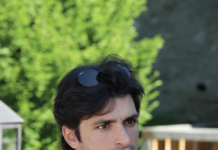I woke up the morning of Sept. 24 anticipating nothing more than a relatively normal day in the world of sports. Reaching to my phone, I scrolled through the various notifications I had gotten earlier that morning and after I went to sleep the night before. These notifications were mostly about European soccer, the time difference causing their daytime dealings to happen in my late night. But there was one MLB post that caught my eye along with a name: Jose Fernandez. Many ideas came to my mind about what it could be about, from his phenomenal pitching numbers to his impact on the local community. I was expecting to read about many things, except for what I actually saw. My heart jumped into my throat and shock that would last came over me.
Miami Marlins ace Jose Fernandez and two of his friends had died in a boating accident. Fernandez was only 24 years old and an expecting father, posting a picture of his pregnant girlfriend on Instagram days before his death with the caption “I’m so glad you came into my life. I’m ready for where this journey is gonna take us together. #familyfirst”.
Fernandez lived as full of a 24 years as anyone. Born in Santa Clara, Cuba on July 31, 1992, Fernandez was taught to love the game at an early age by the father and uncle of Aledmys Diaz, a shortstop currently playing for the St. Louis Cardinals. Clamoring at a chance to play the game he loved, Fernandez failed in defecting to the United States three separate times, serving a separate prison term for each mishap. He was finally successful in 2008 at the age of 15, but not without obstacles. On that trip, Fernandez’s mother fell overboard in turbulent waters and Jose, not knowing it was her, dove in to save her life. Such courage and determination defined Fernandez, and his determination to seek a better life in America quickly made him a fan favorite all around the league, despite having such a tragically short career.
Fernandez was drafted with the 14th pick in the 2011 MLB First-Year Player Draft by the then Florida Marlins. He quickly dominated the minors leagues, accruing a 15-4 record with a 2.32 ERA in just over a year. He made his debut for the Marlins organization in mid-2013, and he showed the world the makings of a bright young star.
With an electric fastball, a slider that seemed to run away from bats, and an infectious smile, Fernandez pitched his way to one of the best rookie seasons of all time. On top of an All Star appearance and an National League Rookie of the Year Award, his strikeout rate was the highest in his league at 9.81 strikeouts per nine innings and he finished third in the National League Cy Young voting behind established ace Adam Wainwright and the eventual winner, Clayton Kershaw. He picked up fans young and old with his inspiring story and dedication to his family, and became an inspiration and an icon to Cuban Americans in the Tampa community where Fernandez lived, the Miami community he played for and beyond.
After his rookie season, Fernandez never looked back, continuing to dazzle for Marlins fans. Games that he pitched at home were dubbed “Jose Day,” and attendance for these games was significantly higher than other games in Miami. He rarely failed to disappoint, compiling an astounding 29-2 record with a miniscule 1.49 ERA.
But what most people will remember are the moments Fernandez had, like the unforgettable GIF that circulated the internet of Fernandez snagging a hard line drive right out of the air to the astonishment of the batter. Nor will we forget the insane reaction to a home run in the dugout, full of joy, laughter and a passion for baseball. That infectious smile and love of the game — that’s what resonated with us baseball fans the most.
In an emotional first game since Fernandez’s passing, the entire club would wear Fernandez’s number 16 one last time before it was retired, the first number to be retired in the Marlins organization since Jackie Robinson’s “42” was retired league-wide. Marlins shortstop and Fernandez’s close friend Dee Gordon stepped up to the plate in the first at-bat since Fernandez’s passing, wearing Fernandez’s batting helmet and took the first pitch as a right-handed batter in his memory before switching helmets. Two pitches later, he ropes the ball over the right field wall for a lead-off home run, tears in his eyes as he rounded the bases. The Marlins all pounded the top railings of the dugout as Gordon rounded the bases, a signature celebration for Fernandez. After the game, Gordon was still overcome by the moment, saying “I ain’t (sic) never hit a ball that far, even in (batting practice). I told the boys, ‘If you all don’t believe in God, you better start.’ For that to happen today, we had some help.” It seemed like a moment out of story book or movie, too perfect and improbable to occur. But for one night, it seemed the magic of Jose Fernandez shone bright.
Now, we are left thinking of what we lost and wondering what could have been. When the name Jose Fernandez is mentioned, many things come to mind. As Miami Marlins Manager Don Mattingly, who only managed Fernandez for a year, put it: “I see such a little boy in him, with the way he played … As mad as he would make you with some of the stuff he would do, you just see that little kid that you see when you watch kids play little league or something like that. That’s the joy that Jose played with. The passion he felt about playing, that’s what I think about.”
Right now, what comes to mind when thinking of Fernandez is tragedy. However, that pain will fade with time. The passion, heart and love that Fernandez showed to us — those things will live on in all those he touched.







